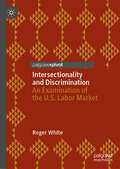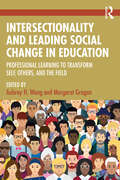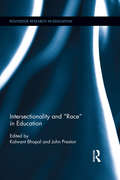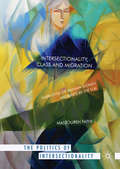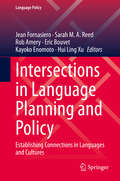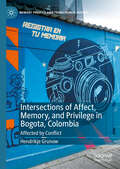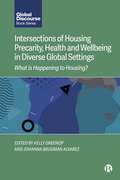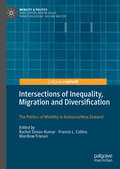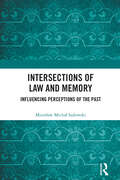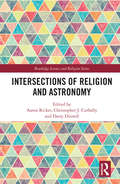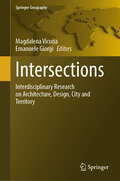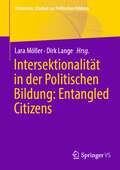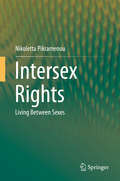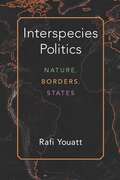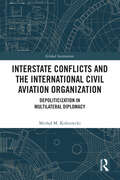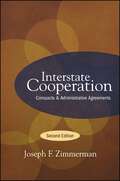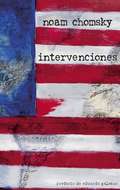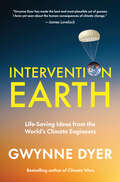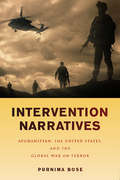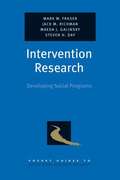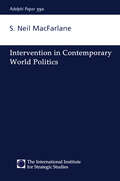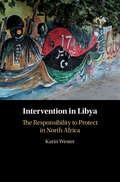- Table View
- List View
Intersectionality and Discrimination: An Examination of the U.S. Labor Market
by Roger WhiteIn 1989, Kimberlé Crenshaw coined the term “intersectionality” to describe the interdependent and overlapping systems of discrimination and disadvantage that result from the interconnected nature of social categorizations. These categories include, but are not limited to, disability, gender identity, nationality, race, and socioeconomic class. In recent years, we have witnessed increased societal interest in the notion of equal economic, political, and social rights. This has commonly manifested in a desire for equality of opportunity (i.e., social justice). This book applies an intersectional approach to examine a specific facet of inequality – namely, the presence and magnitude of wage discrimination in the U.S. labor market. This book accomplishes several objectives. It introduces intersectional analysis for readers who are unfamiliar with the topic. The book identifies intersectional wage discrimination for a large number of worker groups that are defined by multiple intersecting identities (i.e., the personal characteristics of Hispanic ethnicity, nativity, race, and sex). It also documents variation in wage differentials both between worker groups (i.e., contemporaneously) and within groups (i.e., intertemporally). Finally, given the policy relevance of our topic, it is fitting that the final chapter is devoted to corresponding conclusions.
Intersectionality and Leading Social Change in Education: Professional Learning to Transform Self, Others, and the Field
by Margaret Grogan Aubrey H. WangThis book explores a social change and transformational approach to leadership. As educational leaders are increasingly serving a changing demographic of students and also address persistent challenges and heightened tension around race and equity, it is becoming necessary for educators to approach leadership in new and radical ways.Designed for aspiring and current leaders, this book highlights stories of courageous educational leaders with intersectional identities who interrogate and reflect on how their intersectionality shaped their leadership. In turn, these stories help readers explore how lived experiences and deeply held values can shape and inform their own leadership. Chapters conclude with a reader’s guide, prompting reflection upon the nuances of each leader’s journey, and thus, facilitating the discourse of marginalized experiences in educational leadership.This new approach to professional learning helps today’s aspiring principals, aspiring superintendents, and practicing administrators learn how intersectional leadership can help them navigate multiple marginalized spaces and codify new notions of power and success. This volume generates a collection of compelling counter narratives that the field needs to hear.
Intersectionality and Race in Education (Routledge Research in Education)
by Kalwant Bhopal and John PrestonEducation is a controversial subject in which difficult and contested discourses are the norm. Individuals in education experience multiple inequalities and have diverse identifications that cannot necessarily be captured by one theoretical perspective alone. This edited collection draws on empirical and theoretical research to examine the intersections of "race," gender and class, alongside other aspects of personhood, within education. Contributors from the fields of education and sociology seek to locate the dimensions of difference and identity within recent theoretical discourses such as Critical Race Theory, Judith Butler and ‘queer’ theory, post-structural approaches and multicultural models, as they analyze whiteness and the education experience of minority ethnic groups. By combining a mix of intellectually rigorous, accessible, and controversial chapters, this book presents a distinctive and engaging voice, one that seeks to broaden the understanding of education research beyond the confines of the education sphere into an arena of sociological and cultural discourse.
Intersectionality, Class and Migration: Narratives of Iranian Women Migrants in the U.K. (The Politics of Intersectionality)
by Mastoureh FathiThis book offers critical analysis of everyday narratives of Iranian middle class migrants who use their social class and careers to "fit in" with British society. Based on a series of interviews and participant observations with two cohorts of "privileged" Iranian migrant women working as doctors, dentists and academics in Britain--groups that are usually absent from studies around migration, marginality and intersectionality--the book applies narrative analysis and intersectionality to critically analyse social class in relation to gender, ethnicity, places and sense of belonging in Britain. As concepts such as "Nation," "Migrant," "Native," "Other," "Security," and "Border" have populated public and policy discourse, it is vital to explore migrants' experiences and perceptions of the society in which they live, to answer deceptively simple questions such as "What does class mean?" and "How is class translated in the lives of migrants?"
Intersections in Language Planning and Policy: Establishing Connections in Languages and Cultures (Language Policy #23)
by Hui Ling Xu Jean Fornasiero Sarah M. A. Reed Rob Amery Eric Bouvet Kayoko EnomotoThis volume encompasses the range of issues encountered by language scholars who teach and research in departments of languages and cultures within the higher education system, predominantly in Australia, but touching other universities worldwide. Related studies on language planning, methodology or pedagogy have focused on one or more of these same issues, but rarely on their totality. Intersections as a metaphor running discreetly through the essays in this volume, connects them all to a lived reality. The field of languages and cultures, as it is practised and reflected upon in Australian universities, is essentially an interdisciplinary and interconnecting space - one in which linguistic and disciplinary diversities meet and join forces, rather than collide or disperse along different pathways. The international and local studies featured here focus on language planning, new pedagogies and language reclamation and link to meeting points and commonalities. They show that language scholars are increasingly finding themselves on common ground as they tackle issues of policy and practice affecting their field, whether within their institutions, within the tertiary system, or within the framework of government policy.
Intersections of Affect, Memory, and Privilege in Bogota, Colombia: Affected by Conflict (Memory Politics and Transitional Justice)
by Hendrikje GrunowThis book explores the intersections of affect, memory and privilege among Bogota’s upper middle class. Combining approaches from memory studies, anthropology, feminist and affect theory, this work is concerned with the implications for the present and potential futures contained in affective encounters. It is structured along four affects describing the social, spatial, historical and political aspects of ‘being affected’ by the Colombian conflict. After showing how the Colombian conflict is rooted in specific affective relationships to land, disappointment and crushed hopes in the context of various peace negotiations are portrayed as the central experiences nurturing a sense of a doubling or re-experiencing of past emotions. Then, a specifically upper-middle class emotional habitus and its implication for the social connections to people more directly affected by the conflict are outlined, and peace as an upper middle-class affect is revealed as a privilege not everyone deserves.
Intersections of Housing Precarity, Health and Wellbeing in Diverse Global Settings: What Is Happening to Housing? (Global Discourse)
by Kelly Greenop and Johanna Brugman AlvarezThis book examines the specific manifestations and causes of housing precarity across a diverse range of geographic settings and housing types. Housing has been in crisis across the globe for decades. Precarious housing is defined as that which fails to provide an adequate standard of living to enable health and wellbeing for a person and their family. This book argues that, while causes are often structural, the forms of housing precarity need to be deeply and specifically understood in order to propose solutions. Bringing together contributions from diverse academics across different geographies in the global north and south, chapters offer fresh insights into how housing affects wellbeing in terms of physical and mental health, identity and participation in communities.
Intersections of Inequality, Migration and Diversification: The Politics of Mobility in Aotearoa/New Zealand (Mobility & Politics)
by Francis L. Collins Rachel Simon-Kumar Wardlow FriesenThis book examines the relationship between migration, diversification and inequality in Aotearoa/New Zealand. The authors advance a view of migration as a diversifying force, arguing that it is necessary to grapple with the intersection of group identities, state policy and economic opportunities as part of the formation of inequalities that have deep historical legacies and substantial future implications. Exploring evidence for inequality amongst migrant populations, the book also addresses the role of multicultural politics and migration policy in entrenching inequalities, and the consequences of migrant inequalities for political participation, youth development and urban life.
Intersections of Law and Memory: Influencing Perceptions of the Past
by Mirosław Michał SadowskiThis book elaborates a new framework for considering and understanding the relationship between law and memory.How can law influence collective memory? What are the mechanisms law employs to influence social perceptions of the past? And how successful is law in its attempts to rewrite narratives about the past? As the field of memory studies has grown, this book takes a step back from established transitional justice narratives, returning to the core sociological, philosophical and legal theoretical issues that underpin this field. The book then goes on to propose a new approach to the relationship between law and collective memory based on a conception of ‘legal institutions of memory’. It then elaborates the functioning of such institutions through a range of examples – taken from Japan, Iraq, Brazil, Portugal, Rwanda and Poland – that move from the work of international tribunals and truth commissions to more explicit memory legislation. The book concludes with a general assessment of the contemporary intersections of law and memory, and their legal institutionalisation.This book will be of interest to scholars with relevant interests in the sociology of law, legal theory and international law, as well as in sociology and politics.
Intersections of Religion and Astronomy (Routledge Science and Religion Series)
by Aaron Ricker Chris Corbally Darry DinellThis volume examines the way in which cultural ideas about "the heavens" shape religious ideas and are shaped by them in return. Our approaches to cosmology have a profound effect on the way in which we each deal with religious questions and participate in the imaginative work of public and private world-building. Employing an interdisciplinary team of international scholars, each chapter shows how religion and cosmology interrelate and matter for real people. Historical and contemporary case studies are included to demonstrate the lived reality of a variety of faith traditions and their interactions with the cosmos. This breadth of scope allows readers to get a unique overview of how religion, science and our view of space have, and will continue to, impact our worldviews. Offering a comprehensive exploration of humanity and its relationship with cosmology, this book will be an important reference for scholars of Religion and Science, Religion and Culture, Interreligious Dialogue and Theology, as well as those interested in Science and Culture and Public Education.
Intersections: Interdisciplinary Research on Architecture, Design, City and Territory (Springer Geography)
by Emanuele Giorgi Magdalena VicuñaThis book presents a critical vision of the role of architecture and design in constantly changing cities, territories and societies from a Latin American perspective. Topics include, pandemic and post-pandemic; public culture and aesthetics; right to housing, city and services, gender approach and ethics of care; heritage and cultures, critical methodology; sustainable landscapes; perceptions and emotions; processes and technologies; territories and intermediate cities. The IV Intersections Congress was organized by high-level universities in Latin American: faculties of architecture, design and urban studies that came together during an historical moment of great changes. The congress was an invitation to weave conversations that address the tensions emerging in local, regional and global debates, with the goal of understanding how architecture, design, city and territory are a relevant intersection for these tensions. This translation was done with the help of artificial intelligence. A subsequent human revision was done primarily in terms of content.
Intersektionalität in der Politischen Bildung: Entangled Citizens (Citizenship. Studien zur Politischen Bildung)
by Dirk Lange Lara MöllerDieser Sammelband widmet sich dem Schwerpunktthema Intersektionalität und den damit verbundenen Impulsen, Anregungen und Schlussfolgerungen für die Politische Bildung. Der Begriff der Intersektionalität erlaubt es dabei, eine subjektbezogene und lebensnahe Perspektive zu berücksichtigen. Die Beiträge des Sammelbandes diskutieren, wie in einer subjektbezogenen Politischen Bildungsarbeit existierende Interdependenzen und Überschneidungen verschiedener Diskriminierungsformen in der Gesellschaft erfasst werden können. Der Band will dazu beitragen, die didaktischen Potenziale unterschiedlicher Forschungshintergründe vorzustellen und damit verbunden theoretische Überlegungen und empirische Erkenntnisse zum Thema Intersektionalität in der Politischen Bildung zu präsentieren.
Intersex Rights: Living Between Sexes
by Nikoletta PikramenouThis book addresses intersex rights violations and analyses intersex people’s legal demands as expressed by intersex activists themselves and delivered through statements and reports issued by intersex rights organisations, the United Nations and the Council of Europe. Intersex people are born with sex characteristics that do not fit typical notions of male or female bodies, as a result of which they are stigmatised, marginalised and denied the recognition of their fundamental rights. Often, they are subjected to involuntary and harmful sex “normalising” surgeries at birth, which violate their bodily integrity, self-determination and informed consent, so as to comply with societal and legal norms.Moreover, binary legal frameworks prevent them from enjoying the rights to access identification documents, start a family, or be free from discrimination in all areas including employment and sports. To elaborate on intersex violations that emanate from binary laws, this book examines the situation of intersex rights in regional jurisdictions worldwide and within the European Union in particular. In the process, it identifies current legal barriers and suggests how intersex people could be accommodated under legal frameworks and achieve sex/gender equality beyond binary definitions.
Interspecies Ethics (Critical Perspectives on Animals: Theory, Culture, Science, and Law)
by Cynthia WillettInterspecies Ethics explores animals' vast capacity for agency, justice, solidarity, humor, and communication across species. The social bonds diverse animals form provide a remarkable model for communitarian justice and cosmopolitan peace, challenging the human exceptionalism that drives modern moral theory. Situating biosocial ethics firmly within coevolutionary processes, this volume has profound implications for work in social and political thought, contemporary pragmatism, Africana thought, and continental philosophy.Interspecies Ethics develops a communitarian model for multispecies ethics, rebalancing the overemphasis on competition in the original Darwinian paradigm by drawing out and stressing the cooperationist aspects of evolutionary theory through mutual aid. The book's ethical vision offers an alternative to utilitarian, deontological, and virtue ethics, building its argument through rich anecdotes and clear explanations of recent scientific discoveries regarding animals and their agency. Geared toward a general as well as a philosophical audience, the text illuminates a variety of theories and contrasting approaches, tracing the contours of a postmoral ethics.
Interspecies Politics: Nature, Borders, States (Configurations: Critical Studies Of World Politics)
by Rafi YouattThis book explores the ways that international politics is a form of interspecies politics, one that involves the interactions, ideas, and practices of multiple species, both human and nonhuman, to generate differences and create commonalities. While we frequently think of having an international politics “of” the environment, a deep and thoroughgoing anthropocentrism guides our idea of what political life can be, which prevents us from thinking about a politics “with” the environment. This anthropocentric assumption about politics drives both ecological degradation and deep forms of interhuman injustice and hierarchy. Interspecies Politics challenges that assumption, arguing that a truly ecological account of interstate life requires us to think about politics as an activity that crosses species lines. It therefore explores a postanthropocentric account of international politics, focusing on a series of cases and interspecies practices in the American borderlands, ranging from the US-Mexico border in southern Texas, to Guantánamo Bay in Cuba, to Isle Royale, near the US-Canadian border. The book draws on international relations, environmental political theory, anthropology, and animal studies, to show how key international dimensions of states—sovereignty, territory, security, rights—are better understood as forms of interspecies assemblage that both generate new forms of multispecies inclusion, and structure forms of violence and hierarchy against human and nonhuman alike.
Interstate Conflicts and the International Civil Aviation Organization: Depoliticization in Multilateral Diplomacy (ISSN)
by Michał M. KobiereckiThis book investigates the International Civil Aviation Organization (ICAO) and politicized debates held there. The author explores how participants have employed depoliticization as a defensive diplomatic technique in a multilateral forum. Analyzing cases such as the ICAO membership/ statehood of Spain, Taiwan, Cyprus, and South Africa; various instances of the Arab–Israeli conflict; shootdowns of the Korean aircraft by the USSR and Iranian aircraft by the United States; and the 21st century tensions between Russia and Western countries, the book focuses on how states under criticism defended themselves and used depoliticization rhetoric to weaken ICAO decisions. The book allows us to see how rivalries play out in a different environment to more investigated cases in the UN and INGOs such as the International Olympic Committee. This broad scope will appeal to scholars and students of international relations and political science, the Cold War, the Sino–Taiwanese conflict and the Arab–Israeli conflict. It will also appeal to practitioners working in civil aviation.
Interstate Cooperation, Second Edition: Compacts and Administrative Agreements
by Joseph F. ZimmermanCooperative interstate relations are essential for maintaining the economic and political union established by the United States Constitution. Despite this importance, interstate compacts, federal-state compacts, and interstate administrative agreements have generally been neglected by political scientists for more than half a century. In this second edition of Interstate Cooperation, Joseph F. Zimmerman demonstrates that many public goals can be achieved by either a compact or an agreement. Interstate administrative agreements, moreover, may be verbal or written, and have increased sharply in number because their flexibility allows changes to be made quickly without legislative authorization. Zimmerman aims to stimulate additional research on these forms of interstate cooperation in order to help formulate additional innovative solutions to our major interstate problems.
Interstate Water Compacts: Intergovernmental Efforts to Manage America's Water Resources
by Joseph F. ZimmermanLong taken for granted, water resources are rapidly becoming a contentious issue within American politics. Continuing population growth and rapid development, coupled with environmental events such as droughts, have led to increasing water shortages in sections of the nation. In Interstate Water Compacts author Joseph F. Zimmerman highlights the growing importance of water issues within the United States and a device that has been instrumental in facilitating interstate cooperation to solve water-related problems: the interstate compact.This groundbreaking work is the first to devote itself exclusively to interstate and federal-interstate compacts pertaining to controversies including the abatement of water pollution, apportionment of river waters, economic development, flood control, inland fisheries, marine fisheries, and restoration to rivers of anadromous fish, such as salmon and shad. The process for entering into interstate and federal-interstate compacts is explained in detail, as is the exercise of original jurisdiction by the US Supreme Court to resolve intractable interstate controversies involving interpretation of provisions of compacts, water apportionment, and water pollution abatement. Zimmerman concludes by calling for the President, Congress, governors, state legislatures, and local governments to devote more attention and resources to finding solutions for water-related problems.
Intervenciones
by Noam Chomsky Eduardo GaleanoDESDE 2002, Noam Chomsky ha escrito una columna para el servicio de noticias The New York Times, en la que de una manera crítica y contundente analiza los temas más candentes del mundo de hoy. Estos artículos han sido publicados en todo el mundo y han contribuido a que las opiniones de Chomsky sean conocidas a nivel global. En est impactante colección de agudos ensayos, Chomsky analiza la invasion y la ocupación de Irak, la presidencia de Bush, la invasión de Israel al Líbano y otros temas clave de nuestros días. Una oportuna, asequible y excelente contribución de uno de los intelectuales y disidentes politicos más destacados del mundo.Noam Chomsky ha sido profesor de Lingüística y Filosofía en MIT por mas de cincuenta años. Ha escrito numerosos libros, entre los que se destacan Hegemony or Survival y Failed States
Intervention Earth: Life-Saving Ideas from the World's Climate Engineers
by Gwynne DyerHistorian, journalist, and author Gwynne Dyer interviews the world&’s top 100 climate scientists to discuss the extraordinary measures we must contemplate to counter the irreversible effects of climate change.The global climate emergency is now an alarming fact of life. Much as we still need to get emissions under control, many are thinking that it's all too little, too late. As scientists, politicians and concerned citizens scramble for solutions to the catastrophic effects of a warming world, is it time to be exploring the controversial topic of geoengineering?For decades, discerning readers have turned to journalist and historian Gwynne Dyer for his unparalleled acumen in serving up hard geopolitical truths. Intervention Earth is built around Dyer&’s interviews with one hundred climate scientists from around the globe, including the leading figures in the geoengineering field. One of the most interesting topics: the pros and cons of Solar Radiation Management, a possible planetary Hail Mary that is rife with political risks.But Intervention Earth is about more than technological mega-projects. Dyer devotes ample space to the many innovative ideas on offer, but there is no get-out-of-jail-free card. We will need a whole portfolio of techniques and technologies—and a lot of hard, thankless work—to keep the planet hospitable for humanity.What&’s more, many of the technologies that can help us avoid the worst outcomes require years of investment and development before they can be successfully deployed. Global cooperation will be key in implementing the life-saving strategies outlined in the book. With up-to-the-minute, breaking-news reporting Intervention Earth offers a probing, eye-opening look at the problems we face, and the innovations that just might keep us ahead of encroaching disaster and carry us to a safe harbour.
Intervention Narratives: Afghanistan, the United States, and the Global War on Terror (War Culture)
by Purnima BoseIntervention Narratives examines the contradictory cultural representations of the US intervention in Afghanistan that help to justify an imperial foreign policy. These narratives involve projecting Afghans as brave anti-communist warriors who suffered the consequences of American disengagement with the region following the end of the Cold War, as victimized women who can be empowered through enterprise, as innocent dogs who need to be saved by US soldiers, and as terrorists who deserve punishment for 9/11. Given that much of public political life now involves affect rather than knowledge, feelings rather than facts, familiar recurring tropes of heroism, terrorism, entrepreneurship, and canine love make the war easier to comprehend and elicit sympathy for US military forces. An indictment of US policy, Bose demonstrates that contemporary imperialism operates on an ideologically diverse cultural terrain to enlist support for the war across the political spectrum.
Intervention Research: Developing Social Programs
by Mark W. Fraser Jack M. Richman Maeda J. Galinsky Steven H. DayThis book intends to serve as a solid reference for those already in the field, as well as help the next generation of social workers develop skills to contribute to the evolving field of intervention research.
Intervention and Transnationalism in Africa
by Robert Latham Thomas M. Callaghy Ronald KassimirAs the idea of globalization emerges as a key concept in social sciences in the twenty-first century, understanding how external forces and phenomena shape the politics of nation-states and communities is imperative. This 2001 volume calls attention to 'transboundary formations' - intersections of cross-border, national and local forces that produce, destroy or transform local order and political authority, significantly impacting on ordinary people's lives. It analyzes the intervention of external forces in political life, both deepening and broadening the concept of international 'intervention' and the complex contexts within which it unfolds. While transboundary formations can emerge anywhere, they have a particular salience in sub-Saharan Africa where the limits to state power make them especially pervasive and consequential. Including conceptual contributions and theoretically-informed case studies, the volume considers global-local connections, taking a fresh perspective on contemporary Africa's political constraints and possibilities, with important implications for other parts of the world.
Intervention in Contemporary World Politics: Intervention In Contemporary World Politics (Adelphi series)
by Neil MacfarlaneExamines multilateral interventions in civil conflicts and the evolution of the role of such interventions in world politics. It focuses primarily on the Cold War and post-Cold War eras and the differences between them. It contests the notion that there is an emerging norm of humanitarian intervention in international politics, arguing that political interests remain essential to the practice of intervention.
Intervention in Libya: The Responsibility to Protect in North Africa
by Karin WesterThe 2011 crisis in Libya represents the first case in which the international community invoked 'the Responsibility to Protect' principle, adopted in 2005 by UN member states, to justify coercive measures including sanctions and the use of military force. In this study, Karin Wester meticulously reconstructs and analyzes the evolution of the Libyan crisis, the international community's response, and the manner in which the 'Responsibility to Protect' was applied. Drawing on a wide variety of primary sources including in-depth interviews with politicians and diplomats, this comprehensive account of the 2011 intervention in Libya redresses popular narratives asserting that the intervention was driven primarily by western (neo-colonial) interests or by a desire for regime change. Instead, Wester reveals how the 'Responsibility to Protect' principle was realized to a considerable extent, but also how it provided a highly fragile basis for military enforcement action. Incorporating perspectives from international law, political science and history, this is a compelling and thought-provoking examination of the real-world application of a principle that is deeply rooted in history but presents daunting challenges in implementation.
